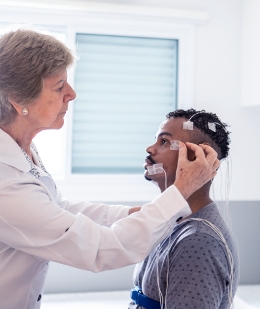

Product Pipeline
Apnimed is exploring novel oral therapeutics targeting sleep-related breathing diseases.
AD109
AD109 is an investigational oral therapy, a pill designed to target the underlying neuromuscular dysfunction in people living with mild, moderate, and severe obstructive sleep apnea (OSA). This novel treatment targets the hypoglossal motor nucleus (HMN) to increase signals in the upper airway dilator muscles during sleep to limit or prevent airway collapse.
AD109 was studied in the now-complete Phase 2b MARIPOSA trial and is currently being evaluated in two Phase 3 clinical trials, SynAIRgy and LunAIRo.
ClosePartnered Programs
![]()
As part of our joint venture with Shionogi & Co., Ltd, Shionogi Apnimed Sleep Science (SASS), we are developing novel oral combination therapeutics designed for people living with OSA and other sleep-related breathing diseases.
Indication:
Obstructive Sleep Apnea
(sivopixant combination)
Indication: Sleep Apnea
with a Central Component
We continue to advance our portfolio of pharmaceutical product
candidates designed to treat a broader range of sleep-related
breathing diseases.


Innovation in OSA: AD109
Discover our paradigm-shifting investigational drug in development for OSA.


Explore Apnimed Clinical Trials
Get information on current trials and see results for completed ones.
AD109 Data in OSA
Read More